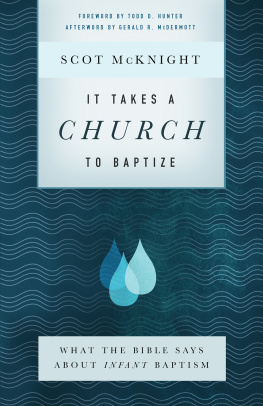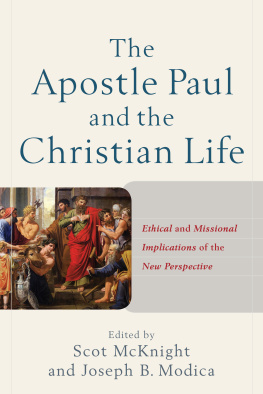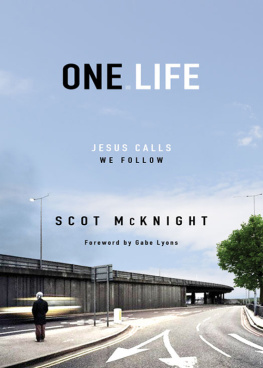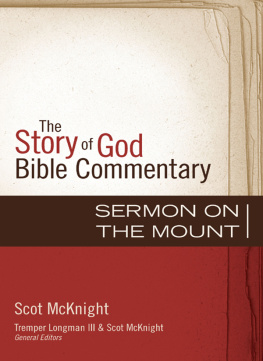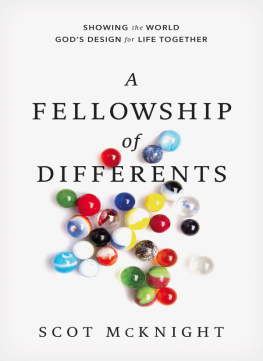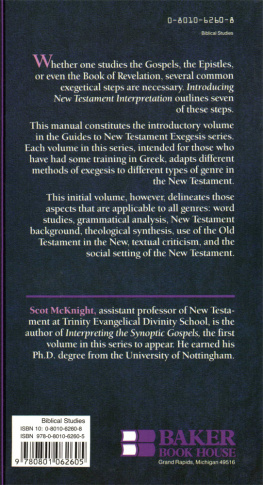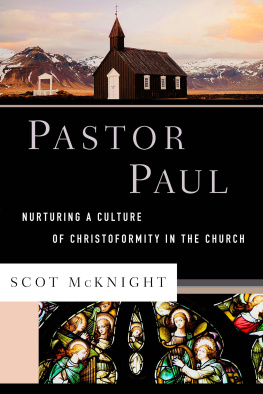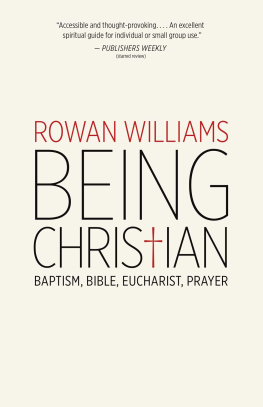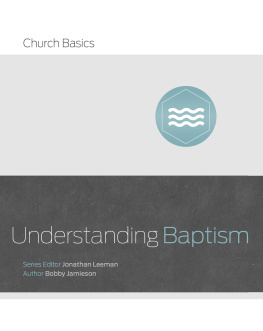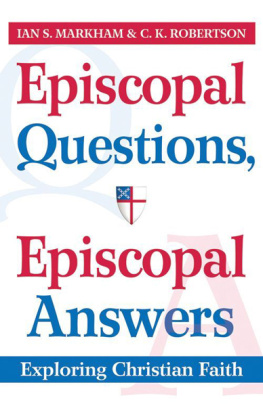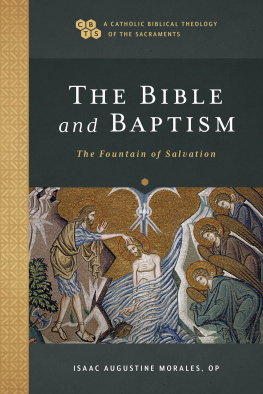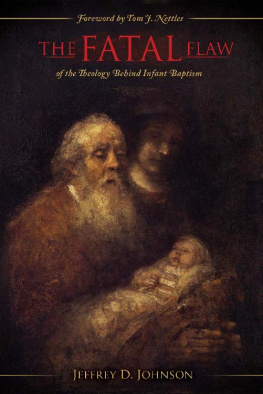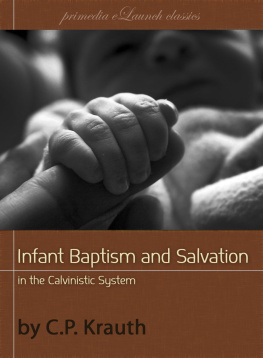Scot McKnight - It Takes a Church to Baptize: What the Bible Says about Infant Baptism
Here you can read online Scot McKnight - It Takes a Church to Baptize: What the Bible Says about Infant Baptism full text of the book (entire story) in english for free. Download pdf and epub, get meaning, cover and reviews about this ebook. year: 2018, publisher: Baker Publishing Group, genre: Religion. Description of the work, (preface) as well as reviews are available. Best literature library LitArk.com created for fans of good reading and offers a wide selection of genres:
Romance novel
Science fiction
Adventure
Detective
Science
History
Home and family
Prose
Art
Politics
Computer
Non-fiction
Religion
Business
Children
Humor
Choose a favorite category and find really read worthwhile books. Enjoy immersion in the world of imagination, feel the emotions of the characters or learn something new for yourself, make an fascinating discovery.
- Book:It Takes a Church to Baptize: What the Bible Says about Infant Baptism
- Author:
- Publisher:Baker Publishing Group
- Genre:
- Year:2018
- Rating:3 / 5
- Favourites:Add to favourites
- Your mark:
- 60
- 1
- 2
- 3
- 4
- 5
It Takes a Church to Baptize: What the Bible Says about Infant Baptism: summary, description and annotation
We offer to read an annotation, description, summary or preface (depends on what the author of the book "It Takes a Church to Baptize: What the Bible Says about Infant Baptism" wrote himself). If you haven't found the necessary information about the book — write in the comments, we will try to find it.
It Takes a Church to Baptize: What the Bible Says about Infant Baptism — read online for free the complete book (whole text) full work
Below is the text of the book, divided by pages. System saving the place of the last page read, allows you to conveniently read the book "It Takes a Church to Baptize: What the Bible Says about Infant Baptism" online for free, without having to search again every time where you left off. Put a bookmark, and you can go to the page where you finished reading at any time.
Font size:
Interval:
Bookmark:
2018 by Scot McKnight
Published by Brazos Press
a division of Baker Publishing Group
PO Box 6287, Grand Rapids, MI 49516-6287
www.brazospress.com
Ebook edition created 2018
Ebook corrections 02.05.2020
All rights reserved. No part of this publication may be reproduced, stored in a retrieval system, or transmitted in any form or by any meansfor example, electronic, photocopy, recordingwithout the prior written permission of the publisher. The only exception is brief quotations in printed reviews.
Library of Congress Cataloging-in-Publication Data is on file at the Library of Congress, Washington, DC.
ISBN 978-1-4934-1463-5
Scripture quotations are from the Holy Bible, New International Version. NIV. Copyright 1973, 1978, 1984, 2011 by Biblica, Inc. Used by permission of Zondervan. All rights reserved worldwide. www.zondervan.com
Published in association with the literary agency of Daniel Literary Group, LLC, Nashville, TN.
As someone who grew up Baptist and has wrestled deeply with questions about infant baptism, I wish I could have read this book years ago. McKnight has given the church an enduring gifta book that is theologically rich, serious, and steeped in tradition yet accessible and readable. As a mother of young children and as a priest, I will put this book in the hands of many a friend and parishioner. If you are a parent deciding whether to baptize infant children, this book is essential reading.
Tish Harrison Warren , priest in the ACNA, co-associate rector (Church of the Ascension Pittsburgh), and author of Liturgy of the Ordinary: Sacred Practices in Everyday Life
Able, strong, wise, and biblically and theologically richthats pretty much the case with anything Scot McKnight writes. And here he goes again, this time on the subject of infant baptism. There are a great number of confusions and misunderstandings about infant baptism that Scot thoughtfully clarifies. So even if you dont end up being convinced, you will know why people like Scot (and me) think it is a practice essential for proper Christian discipleship.
Mark Galli , editor in chief, Christianity Today
Scot McKnight provides a controversial though ultimately compelling case for infant baptism. He narrates his own journey from previously holding to believers baptism as an Anabaptist to now settling on infant baptism as an Anglican. McKnight offers here a robust biblical defense of infant baptism. But it is not just the who and how of baptism that he tackles; the genius of this book is that McKnight elegantly explains what baptism is even about, what it means, what it does for the recipient, and why it really does take a church to baptize a child. Read it with caution: this book could change your whole view of conversion, faith, family, childrens ministry, and the church!
Michael F. Bird , Ridley College, Melbourne, Australia
In It Takes a Church to Baptize , Scot McKnight offers the most compelling case for infant baptism available today. Not content to sprinkle with prooftexts, McKnight immerses his reader in the biblical, historical, and sacramental theology of this ancient Christian practice, and seals it with a testimony of how his mind was changed. Read this bookand remember your baptism!
Joel Scandrett , Robert E. Webber Center, Trinity School for Ministry
Somebody has needed to write this book for some time, but maybe we were waiting for Scot McKnight. It Takes a Church to Baptize is just the right prescription for many Christians drawn to more deeply rooted expressions of the Christian faith but facing an obstacle of conscience: Yes, eventually the church came to baptize infants, but can such a practice possibly be biblical? What, if anything, does that action actually accomplishor does it merely signify? Having been on this journey himself, McKnight offers a more-than-biblical account of these and other questions, not merely with a scorecard of exegetical skirmishes but with a holistic biblical theology rendering the people of God and rehearsing the actions of a saving God. This finally will be the book I recommend to Christians asking these questions.
Garwood P. Anderson , Nashotah House Theological Seminary
To those who, like the Bereans of Pauls mission, with noble character open their Bibles and examine the Scriptures every day
to see if what... is said is true. As a result, many of them believe.
(based on Acts 17:1112)
Cover
Title Page
Copyright Page
Endorsements
Dedication
Foreword by Todd D. Hunter
Preface: A Letter
1. Our Baptism: First Six Words
2. Baptism: Church and Family
3. Presentation and Commitments
4. The Three Great Themes of Our Baptism
5. The Bible and Infant Baptism
6. The Act of Baptism
7. My Personal Testimony
Afterword by Gerald R. McDermott
Notes
Scripture and Ancient Writings Index
Subject Index
Back Cover
In 1979 I was a young church planter in a city that seemed full of young, lapsed Catholics. I cant remember exactly what the young girl had done (premarital sex? underage drinking? experimenting with drugs?), but Ill never forget her ethnic Catholic mom, tears running down her face, screaming at her through a cry-choked voice: How could you do that? You were baptized!
That moment played right into and vindicated my then-existing bias that infant baptism was a dead, or at best rote, religious ceremony that accomplished nothingsimilar to marriage vows that commonly end in divorce. It also reinforced my fear that infant baptism did not normally lead to personal and real salvation.
Setting aside Catholics and mainline Protestants for a moment, it is true that mid-twentieth-century evangelicals also deserve criticism for their own faults regarding salvation and discipleship. But even so, who could blame us, looking at the state of the mainline churches in the 1960s and 1970s that practiced infant baptism, for wondering what good it did? It seemed one could more easily draw a correlation between infant baptism and unfaithfulnessbetween infant baptism and millions of crying, yelling parents!
Into this picture comes the valuable voice of my friend and colleague Scot. He offers a corrective by saying it takes a church community and a familysponsors, godparents, and a praying congregationto baptize well.
But as a young evangelical, I strongly believed the opposite: baptism was a sign of a previous moment of salvation, and furthermore, it was precisely a personal decision to follow the command of Jesus and the biblical norm to be baptized. Baptism, in its essence, had only to do with me and God. We went forward down the aisle to get saved as individuals , not as families, not even as groups of friends. We were unapologetically dissing the (usually mainline) church of our families! There were people standing around the pool when I was rebaptized as an adult, but they were bystanders (loving as they might have been), peripheral to what was centrally happening between me and God. Or so I thought...
Coming forward to today, I am often asked about my journey from the Jesus Movement (Calvary Chapel) and the charismatic stream of evangelicalism (the Vineyard) to the sacramental part of the churchspecifically, the Anglican Church in North America. Inevitably, as part of that conversation, a person will ask: How, given your background with infant dedication and adult baptism, did you come to believe in and practice infant baptism? I must confess that, as I considered entering the Anglican community and surveyed the theological landscape of Anglicanism, I had only one big theological issue to process, and it was that precise subject: infant baptism.
Font size:
Interval:
Bookmark:
Similar books «It Takes a Church to Baptize: What the Bible Says about Infant Baptism»
Look at similar books to It Takes a Church to Baptize: What the Bible Says about Infant Baptism. We have selected literature similar in name and meaning in the hope of providing readers with more options to find new, interesting, not yet read works.
Discussion, reviews of the book It Takes a Church to Baptize: What the Bible Says about Infant Baptism and just readers' own opinions. Leave your comments, write what you think about the work, its meaning or the main characters. Specify what exactly you liked and what you didn't like, and why you think so.

